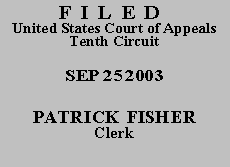

| JANICE LEE UNDERWOOD,
Petitioner - Appellant, v. NEVILLE MASSIE, Warden, Respondent - Appellee. |
|
Petitioner Janice Lee Underwood, appearing pro se, appeals from the district court's denial of her habeas corpus petition, filed pursuant to 28 U.S.C.
§ 2254. Petitioner sought to raise seven issues on appeal. This court granted a certificate of appealability (COA) pursuant to 28 U.S.C. § 2253(c) solely with respect to one issue: her claim that her trial counsel rendered ineffective assistance of counsel by preventing her from testifying on her own behalf.
Petitioner was convicted in Oklahoma state court of murder in the first degree and sentenced to life imprisonment without possibility of parole. Her conviction was upheld on direct appeal by the Oklahoma Court of Criminal Appeals (OCCA). She filed an application for state post-conviction relief, which was denied, and the OCCA affirmed that denial. Petitioner then filed her federal § 2254 habeas petition in January 2002.
Petitioner claims she was denied effective assistance of counsel, alleging that her trial counsel "stood in the way" of her asserting her right to testify. R. Doc. 1, at 4. The only specific information she provides is her allegation that counsel rested the defense case without giving her an opportunity to testify and, when she objected, he told her it was too late. Id. To establish the denial of effective assistance of counsel, petitioner must show both that her attorney's performance fell below an objective standard of reasonableness and that this deficient performance prejudiced the defense and deprived petitioner of a fair trial. See Strickland v. Washington, 466 U.S. 668, 687-88 (1984).
We have held that a habeas petitioner "bears the burden of alleging facts which, if proved, would entitle [her] to relief" and that her "allegations must be specific and particularized" to warrant an evidentiary hearing on ineffective assistance of counsel. Hatch v. Oklahoma, 58 F.3d 1447, 1457 (10th Cir. 1995) (quotations omitted). Petitioner does not explain how her trial counsel "stood in the way" of her right to testify, how or when she informed counsel of her alleged desire to testify or even how the absence of her testimony prejudiced her defense. She "fails to cite, let alone apply, the controlling" Strickland framework. Thomas v. Gibson, 218 F.3d 1213, 1223 n.9 (10th Cir. 2000) (holding ineffective assistance of counsel claim so inadequately briefed that it was deemed waived where petitioner failed to cite or apply Strickland). Petitioner's allegations are merely conclusory and are insufficient to support her ineffective assistance claim. See United States v. Fisher, 38 F.3d 1144, 1147 (10th Cir. 1994) (rejecting ineffective assistance of counsel claims as "conclusory in nature and without supporting factual averments").
Moreover, the transcript does not support petitioner's assertion that her trial counsel prevented her from testifying. The transcript indicates that her trial counsel announced in open court at the close of the state's case that he would not be calling petitioner to testify. The record does not reflect any objection by petitioner to this assertion at the close of the state's case, nor does it indicate she raised any objection at the close of the defense case or at any other time. See United States v. Janoe, 720 F.2d 1156, 1161 n.9 (10th Cir. 1983) (holding that right to testify not denied where "defendant made no objection to his attorney's statements that defendant would not testify and made no request to testify"). Petitioner may have been influenced by her counsel's advice suggesting that she not testify, but any such influence does not amount to ineffective assistance of counsel. Cf. Hooks v. Ward, 184 F.3d 1206, 1219 (10th Cir. 1999) (quotation omitted) (finding no error when counsel advised defendant not to testify). Finally, we agree with the district court that petitioner has not attempted to show that the result of the trial would have been different had she testified. See id. at 1218 (holding that "petitioner must show that there is a reasonable probability that, but for counsel's unprofessional errors, the result of the proceeding would have been different." (quotation omitted)).
We conclude the district court did not err in rejecting petitioner's claim of ineffective assistance of counsel. The motion to proceed in forma pauperis is GRANTED. The judgment of the district court is AFFIRMED. The mandate shall issue forthwith.
Entered for the Court
Circuit Judge
*. This order and judgment is not binding precedent, except under the doctrines of law of the case, res judicata, and collateral estoppel. The court generally disfavors the citation of orders and judgments; nevertheless, an order and judgment may be cited under the terms and conditions of 10th Cir. R. 36.3.